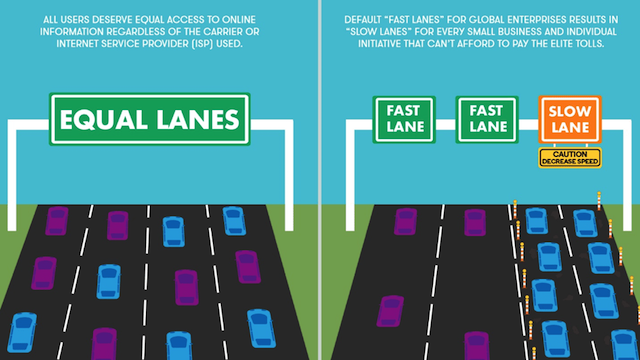The internet belongs to all of us! Preserving net neutrality and the information commons

In two days, the Federal Communications Commission (FCC) will vote to repeal net neutrality, a 2015 ruling that enacted oversight of internet service providers (ISPs) like Comcast and Verizon on the principle that they should treat all content on the internet equally.
If right now the internet is a “place where the lowest income user has the same access to unfiltered information as the wealthiest, and where individuals can successfully compete with multibillion-dollar corporations”… Imagine the opposite.
A place where you have to “pay to play.” A place where the wealthy get high-speed internet access, while low-income families are confined to the slow lane and our country becomes one where people must pay for access to information, entertainment, and the social and political capital that comes with expanding one’s network and connecting with other people. It’s not hard to imagine: We’ve already seen this type of censorship in net neutrality violations where, for example, companies have censored text messages sent to reproductive rights activists who signed up to receive alerts.
Fair internet access is essential for shared prosperity.
The internet, whose development in the US was funded by the American public (the Department of Defense) is a public good, like electricity and broadcasting. We think about this in the context of banking, which we consider to be quasi-public because of the privileges we the public have bestowed upon the banking system. Consider the FDIC: Federal deposit insurance set up by the government that makes it possible for someone to run a bank and hold your and my cash deposits.
Without limits, the financial institutions and ISPs serving us these public goods can harm citizens. During the financial crisis, we saw what happens when banks operate unchecked. And still, it’s not difficult to envision a future where access to services and information is in the hands of corporations, not the people, and the people have to pay those corporations to get access to free and available information.
Getting rid of net neutrality might widen our already increasing economic inequality gap and would leave consumers unprotected. Not only would those with lower incomes be adversely affected by increased costs, but people of color also stand to be disproportionately disadvantaged — including their ability to make their voices heard on the internet — by the loss of the rule. Repealing net neutrality rules would also have significant impacts on health outcomes in rural communities where people rely on telehealth services, and in LGBTQ communities where young people often must turn to the internet to access health education resources.
A thriving economy is one in which everyone who desires to participate has the option to do so, and everyone has equal access and choice. A strong public utility backbone, which includes fair internet access, is essential for shared prosperity that comes out of full participation.
It’s true that California, as an example, has innovation and prosperity a-plenty — the state has some of the richest zip codes in the country! Yet almost 20 percent of Californians live at or close to the poverty line. We do not share prosperity. By establishing a pay-to-play internet, it’s clear who will win and who will lose.
We already know trickle-down economics doesn’t work. Earlier this month we saw a tax bill pass that will leave America’s wealthiest as the winners, at the expense of low and middle income communities. When the national debt balloons, we’ll hear the GOP’s call to cut costs to social services and healthcare to make up for it, further undermining low and middle income families’ chances at getting ahead. Privileging corporations and wealthy people does not foster economic opportunity; it leaves huge swaths of our country high and dry. This kind of increasing inequality is not only an affront to our sense of justice and fairness, but also to our democracy — everyone’s ability to access opportunity and to participate.
If you’ve been following the net neutrality debate, you’ve probably heard that 30 percent of Americans don’t have a choice when it comes to their ISP. Thirty seven percent can choose between only two. Without net neutrality disallowing filtered data lanes, huge chunks of the population stand to lose at the whims of these corporate ISPs.
Do you trust that your internet provider will put your interest above its own?
We also have to look at who has access right now. The rural-urban digital gap is stark: While 96 percent of urban Americans have access to broadband service, 39 percent of rural Americans lack access. There is also a gap within America’s major cities: In Detroit, for example, 40 percent of the population does not have any internet access.
“Because of high foreclosure rates, and because of bad credit, a lot of telecom companies don’t offer good service within these areas, or they won’t even turn on their fibers so we have a lot of dark fiber that doesn’t have internet running though it throughout the city,” says Diana Nucera, director of the Detroit Community Technology Project. Luckily, community-based organizations are working locally to address this need by installing high speed internet systems in the homes of Detroiters who have not had internet access. Still Detroit is a prime example of what happens when consumers are left unprotected from entities that are supposed to serve their needs.
Christopher Mitchell at the Institute for Local Self-Reliance explains that without net neutrality rules, major ISPs will be able to extract more money from their existing customer base, providing less of an incentive to expand their customer base into those areas lacking internet access now. The prediction makes sense: With even fewer rules, why should we expect to see investment into rural communities, which already face disinvestment? Mitchell says areas without access need rules to protect them. If there’s no hope for competition, there’s no hope for a marketplace to regulate behavior.
Without net neutrality, we are beholden to corporations whose primary interest is profit. These companies will further entrench their position as “gatekeepers to the internet.” To paraphrase Mignon Clyburn at the FCC: Do you unequivocally trust that your internet provider will put your interest above its own?
Exactly.
So, what can you do?
- Keep net neutrality in place. Take action at battleforthenet.com
- Invest directly into low- and middle-income communities, with their needs and economic and racial equity in mind. Think of all the untapped innovation and abundance in these communities, often out of reach because of severe unequal access to basic services. That might look like banking local, supporting local business, and investing your time and energy into power-building within these communities.
- Look to the communities that are making it work with place-based solutions, cooperative solutions. There are more than 350 organizations across the US where cooperatives are currently delivering fiber to the people.
Emma is the Strategic Communications Director and Symone is the Social Media and Digital Engagement Manager for Beneficial State Foundation, both based in Oakland, CA.
This blog post reflects the authors’ personal views and opinions. It does not represent the views and opinions of Beneficial State Bank and/or Beneficial State Foundation.



